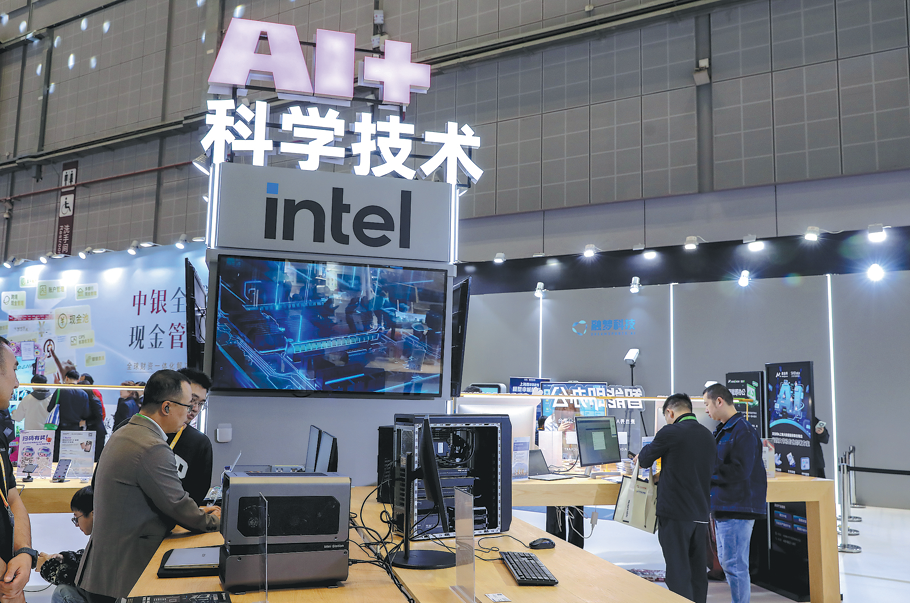BCG: Chinese companies leading APAC region in AI application

Visitors check out Intel's large language model during the eighth China International Import Expo on Nov 6 in Shanghai. CHINA DAILY
Chinese companies are at the global forefront in adopting artificial intelligence at work and are optimistic about its potential thanks to the widespread enthusiasm for AI driven by digitally skilled and ambitious young employees, according to a report from Boston Consulting Group.
The report noted that the Asia-Pacific region takes the lead in exploring and adopting AI globally, and China stands out among the front-runners, with 87 percent of respondents reporting frequent use of AI tools, surpassing the global average of 72 percent.
The strong adoption trend spans all job levels covering frontline employees, middle-level managers and senior executives, reflecting a bottom-up culture of exploration and a high degree of openness and adaptability to new technologies, it noted.
The report found that 78 percent of overall respondents in the APAC region use AI at work at least weekly, compared to 72 percent worldwide. Only 51 percent of global frontline workers use AI regularly, but the rate jumps to 70 percent in the APAC region.
The region's higher AI usage is accompanied by greater enthusiasm, with 60 percent of APAC respondents feeling optimistic about AI's potential, compared to 52 percent globally.
However, there is an inherent tension to AI usage as greater adoption of AI leads to greater fear of future job loss. Even as employees in APAC adopt AI at a faster pace than those in other regions, more employees fear losing their jobs, with 52 percent of respondents expressing that concern, compared to 41 percent globally.
The report surveyed more than 4,500 employees engaged in various industries across nine countries in the APAC region.
Jeff Walters, managing director and senior partner of BCG, said the speed at which Chinese employees are embracing AI is remarkable, highlighting that this bottom-up wave of enthusiasm, driven by frontline workers, is becoming a unique advantage for China's AI innovation.
The report said with China's high AI adoption rate, the concerns over its use are more obvious. Only 18 percent of frontline employees in China said they have received clear guidance from leadership on how to use AI, signifying that the strategic vision of company executives needs to catch up with employees' practices.
In addition, most Chinese companies remain at the stage of AI tool deployment, with only a small number beginning to redesign workflows or adjust job roles, indicating that a vast amount of productivity potential remains to be unlocked.
"Competitiveness in the AI era doesn't lie in the widespread adoption of tools, but in their systematic and strategic application," said Jeffrey Wu, managing director and partner of BCG, adding that relatively few frontline employees feel they receive clear guidance from company executives.
The report said that as businesses in APAC continue to lead the world in AI adoption and innovation, they should respond to their employees' growing acceptance of AI and the innovation promised by AI agents, redesigning their workflows to accommodate the transition.
Moreover, CEOs should drive the change both from the top down — through such approaches as reskilling at scale, continuously evaluating and upgrading AI tools, formalizing governance and setting a clear AI vision — and from the bottom up, empowering digitally native frontline workers while closing skills gaps for middle managers.
Pan Helin, a member of the Expert Committee for Information and Communication Economy, which is part of the Ministry of Industry and Information Technology, said the rapid adoption of digital technologies represented by AI will inject fresh impetus into the country's economic growth and speed up digital and intelligent upgrades in enterprises.
China boasts a large number of well-educated engineering talent and AI professionals, improved digital infrastructure such as 5G and computing networks, massive amounts of data and ever-increasing innovation capabilities, which provide a solid foundation for the training and adoption of AI models, he added.
Photos
 Int'l delegation explores organic tea culture in Baisha, S China's Hainan
Int'l delegation explores organic tea culture in Baisha, S China's Hainan Chamber Concert of Chinese Classical Music held at China Cultural Center in Kuwait
Chamber Concert of Chinese Classical Music held at China Cultural Center in Kuwait 27th Harbin Ice-Snow World to officially begin construction in NE China
27th Harbin Ice-Snow World to officially begin construction in NE China Promotion week for intangible cultural heritage brands opens in Dali, China's Yunnan
Promotion week for intangible cultural heritage brands opens in Dali, China's Yunnan
Related Stories
- Experts praise China's expanding role in connectivity and AI?at Dubai Future Forum
- AI-related skills prove to be hot commodity
- Explainer: China moves forward with its "AI Plus" initiative
- Finding the human voice in an age of AI translation
- GraphicAnalysis: China's AI models innovation offers immense opportunities for the world
- China accelerates cultivation of elite talents in AI, integrated circuits
- AI innovation powers China's lead in smart eyewear
- China's open-source AI model launches consumer chatbot to claim mass market
- China's intelligent computing power ranks among the world's top
- New solutions to drive country's 'AI+' initiative
Copyright © 2025 People's Daily Online. All Rights Reserved.





